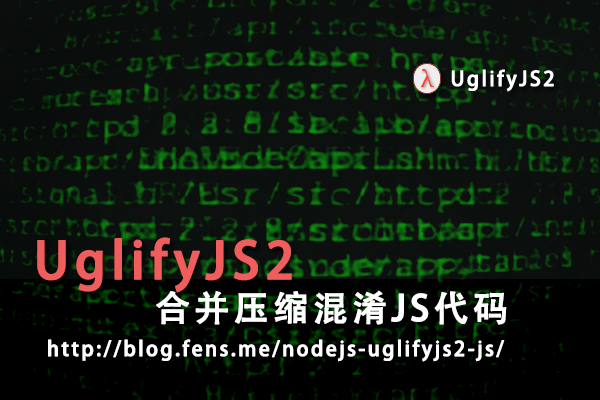从零开始nodejs系列文章,将介绍如何利Javascript做为服务端脚本,通过Nodejs框架web开发。Nodejs框架是基于V8的引擎,是目前速度最快的Javascript引擎。chrome浏览器就基于V8,同时打开20-30个网页都很流畅。Nodejs标准的web开发框架Express,可以帮助我们迅速建立web站点,比起PHP的开发效率更高,而且学习曲线更低。非常适合小型网站,个性化网站,我们自己的Geek网站!!
关于作者
- 张丹(Conan), 程序员Java,R,PHP,Javascript
- weibo:@Conan_Z
- blog: http://blog.fens.me
- email: bsspirit@gmail.com
转载请注明出处:
http://blog.fens.me/nodejs-uglifyjs2-js/
前言
做Web前端开发,总是要考虑页面的打开速度,如果文件数量越少、文件长度越小,就可以直接的提升网页的访问速度。
但在开发的时候,为了保证代码的可读性,我们写的程序文件会很多而且很大,这样就与部署的要求发生背离,通过UglifyJS2这个工具,我们可以在开发完成时,对代码文件进行 合并、混淆、压缩 等的操作,达到最优的访问性能。
目录
- UglifyJS介绍
- UglifyJS2介绍
- UglifyJS2安装
- UglifyJS2命令操作
- UglifyJS2的API使用
1. UglifyJS介绍
开始UglifyJS2介绍之前,我们先要说一下UglifyJS。UglifyJS是UglifyJS2的前身,是一个Javascript开发的通用的语法分析、代码压缩、代码优化的一个工具包。UglifyJS是基于Nodejs环境开发,支持CommonJS模块系统的任意的Javascript平台。
UglifyJS的实现主要分为2部分:
- 生成JS代码的抽象语法树(AST),通过parse-js.js完成。
- 遍历AST语法树,做各种操作,比如自动缩进、缩短变量名、删除块括号{}、去空格、常量表达式、连续变量声明、语块合并、去掉无法访问的代码等,通过process.js完成。
2. UglifyJS2介绍
UglifyJS2是作者对UglifyJS的重写,是完全的重写,而不仅仅是升级。从UglifyJS2官司方网页介绍看,UglifyJS2把整个的JS压缩过程,做了更进一步的细化。
- parser,用于实现抽象语言法树(AST)。
- the code generator, 通过AST生成JS代码和source map。
- compressor, 用于JS代码的压缩。
- mangler, 用于减少局部变量的命名,用单字母替换。
- scope analyzer, 用来判断 变量定义范围和变量引用范围的工具。
- tree walker, AST树遍历工具。
- tree transformer, AST树转换工具。
上述所有的功能代码API是在6500行的左右,比其他的相同功能的开发包都要小。作者还提供了一个在线版本UglifyJS2的JS压缩工具,http://lisperator.net/uglifyjs/,大家可以测试一下。
3. UglifyJS2安装
系统环境:
- win7 64bit
- Nodejs:v0.10.5
- Npm:1.2.19
UglifyJS2的安装非常简单,和Nodejs的其他包一样,全局安装使用如下命令。
npm install uglify-js -g也可以通过github下载源代码安装。
git clone git://github.com/mishoo/UglifyJS2.git
cd UglifyJS2
我们在使用UglifyJS2的时候主要有2种方式,一种是通过命令行操作,对指定的JS文件进行压缩;另一种是通过程序的API调用,对文件或内存中的JS代码进行压缩。下面我将分两种情况进行介绍。
4. UglifyJS2命令操作
在全局安装好UglifyJS2以后,我们就可以使用UglifyJS2的命令了。
打印uglifyjs命令行的帮助信息,会打出很长一段说明。
D:\workspace\javascript\nodejs-uglifyJS2>uglifyjs -h
D:\toolkit\nodejs\\node.exe D:\toolkit\nodejs\node_modules\uglify-js\bin\uglifyjs input1.js [input2.js ...] [options]
Use a single dash to read input from the standard input.
NOTE: by default there is no mangling/compression.
Without [options] it will simply parse input files and dump the AST
with whitespace and comments discarded. To achieve compression and
mangling you need to use `-c` and `-m`.
Options:
--source-map Specify an output file where to generate source
map. [string]
--source-map-root The path to the original source to be included
in the source map. [string]
--source-map-url The path to the source map to be added in //#
sourceMappingURL. Defaults to the value passed
with --source-map. [string]
--source-map-include-sources Pass this flag if you want to include the
content of source files in the source map as
sourcesContent property. [boolean]
--in-source-map Input source map, useful if you're compressing
JS that was generated from some other original
code.
--screw-ie8 Pass this flag if you don't care about full
compliance with Internet Explorer 6-8 quirks
(by default UglifyJS will try to be IE-proof).
[boolean]
--expr Parse a single expression, rather than a
program (for parsing JSON) [boolean]
-p, --prefix Skip prefix for original filenames that appear
in source maps. For example -p 3 will drop 3
directories from file names and ensure they are
relative paths. You can also specify -p
relative, which will make UglifyJS figure out
itself the relative paths between original
sources, the source map and the output file.
[string]
-o, --output Output file (default STDOUT).
-b, --beautify Beautify output/specify output options.
[string]
-m, --mangle Mangle names/pass mangler options. [string]
-r, --reserved Reserved names to exclude from mangling.
-c, --compress Enable compressor/pass compressor options. Pass
options like -c
hoist_vars=false,if_return=false. Use -c with
no argument to use the default compression
options. [string]
-d, --define Global definitions [string]
-e, --enclose Embed everything in a big function, with a
configurable parameter/argument list. [string]
--comments Preserve copyright comments in the output. By
default this works like Google Closure, keeping
JSDoc-style comments that contain "@license" or
"@preserve". You can optionally pass one of the
following arguments to this flag:
- "all" to keep all comments
- a valid JS regexp (needs to start with a
slash) to keep only comments that match.
Note that currently not *all* comments can be
kept when compression is on, because of dead
code removal or cascading statements into
sequences. [string]
--preamble Preamble to prepend to the output. You can use
this to insert a comment, for example for
licensing information. This will not be
parsed, but the source map will adjust for its
presence.
--stats Display operations run time on STDERR.
[boolean]
--acorn Use Acorn for parsing. [boolean]
--spidermonkey Assume input files are SpiderMonkey AST format
(as JSON). [boolean]
--self Build itself (UglifyJS2) as a library (implies
--wrap=UglifyJS --export-all) [boolean]
--wrap Embed everything in a big function, making the
“exports” and “global” variables available. You
need to pass an argument to this option to
specify the name that your module will take
when included in, say, a browser. [string]
--export-all Only used when --wrap, this tells UglifyJS to
add code to automatically export all globals.
[boolean]
--lint Display some scope warnings [boolean]
-v, --verbose Verbose [boolean]
-V, --version Print version number and exit. [boolean]
--noerr Don't throw an error for unknown options in -c,
-b or -m. [boolean]
对命令参数进行解释:
- –source-map [string],生成source map文件。
- –source-map-root [string], 指定生成source map的源文件位置。
- –source-map-url [string], 指定source map的网站访问地址。
- –source-map-include-sources,设置源文件被包含到source map中。
- –in-source-map,自定义source map,用于其他工具生成的source map。
- –screw-ie8, 用于生成完全兼容IE6-8的代码。
- –expr, 解析一个表达式或JSON。
- -p, –prefix [string], 跳过原始文件名的前缀部分,用于指定源文件、source map和输出文件的相对路径。
- -o, –output [string], 输出到文件。
- -b, –beautify [string], 输出带格式化的文件。
- -m, –mangle [string], 输出变量名替换后的文件。
- -r, –reserved [string], 保留变量名,排除mangle过程。
- -c, –compress [string], 输出压缩后的文件。
- -d, –define [string], 全局定义。
- -e, –enclose [string], 把所有代码合并到一个函数中,并提供一个可配置的参数列表。
- –comments [string], 增加注释参数,如@license、@preserve。
- –preamble [string], 增加注释描述。
- –stats, 显示运行状态。
- –acorn, 用Acorn做解析。
- –spidermonkey, 解析SpiderMonkey格式的文件,如JSON。
- –self, 把UglifyJS2做为依赖库一起打包。
- –wrap, 把所有代码合并到一个函数中。
- –export-all, 和–wrap一起使用,自动输出到全局环境。
- –lint, 显示环境的异常信息。
- -v, –verbose, 打印运行日志详细。
- -V, –version, 打印版本号。
- –noerr, 忽略错误命令行参数。
通过对命令行各种参数的解释,我们基本上知道了这些参数都是干什么的了,下面我就试一下。
写2个简单地JS文件,demo.js, main.js。
~ vi D:\workspace\javascript\nodejs-uglifyJS2\demo.js
'use strict';
function hello(name){
if(name==='fens.me'){
return "Long time no see, "+name;
}
return "hello "+name;
}
console.log(hello('Conan'));
console.log(hello('fens.me'));
main.js
~ vi D:\workspace\javascript\nodejs-uglifyJS2\main.js
'use strict';
function book(){
return [
{head:'前言',page:'/views/tpl/book-r1/preface.html',active:false},
{head:'目录',page:'/views/tpl/book-r1/contents.html',active:true},
{head:'代码',page:'/views/tpl/book-r1/code.html',active:false},
{head:'试读',page:'/views/tpl/book-r1/sample.html',active:false},
{head:'勘误',page:'/views/tpl/book-r1/mistake.html',active:false}
];
}
var tab=function(arr,idx){
for(var i=0;i<arr.length;i++){
arr[i].active = (idx==i?true:false);
}
return arr;
}
console.log(tab(book(),3));
接下来,用UglifyJS2命令进行操作,合并两个文件,对变量名用单字母替换,进行压缩,所有代码合并到一个函数,生成source map,指定source map来源网站。
D:\workspace\javascript\nodejs-uglifyJS2>uglifyjs main.js demo.js -o foo.min.js --source-map foo.min.js.map --source-map-root http://onbook.me -p 5 -c -m --wrap --export-all
在当前目录生成了2个新文件:foo.min.js.map, foo.min.js,分别查看这两个文件。
foo.min.js
!function(e,t){"use strict";function o(){return[{head:"前言",page:"/views/tpl/book-r1/preface.html",active:!1},{head:"目录",page:"/views/tpl/book-r1/contents.html",active:!0},{head:"代码",page:"/views/tpl/book-r1/code.html",active:!1},{head:"试读",page:"/views/tpl/book-r1/sample.html",active:!1},{head:"勘误",page:"/views/tpl/book-r1/mistake.html",active:!1}]}function n(e){return"fens.me"===e?"Long time no see, "+e:"hello "+e}t["true"]=e,console.log(a(o(),3));var a=function(e,t){for(var o=0;ofoo.min.js.map
{"version":3,"file":"foo.min.js","sources":["?"],"names":["exports","global","book","head","page","active","hello","name","console","log","tab","arr","idx","i","length","this"],"mappings":"CAAC,SAASA,EAASC,GAAnB,YAEA,SAASC,KACL,QACKC,KAAK,KAAKC,KAAK,kCAAkCC,QAAO,IACxDF,KAAK,KAAKC,KAAK,mCAAmCC,QAAO,IACzDF,KAAK,KAAKC,KAAK,+BAA+BC,QAAO,IACrDF,KAAK,KAAKC,KAAK,iCAAiCC,QAAO,IACvDF,KAAK,KAAKC,KAAK,kCAAkCC,QAAO,IANjE,QAASC,GAAMC,GACd,MAAU,YAAPA,EACK,qBAAqBA,EAEtB,SAASA,EANWN,EAAO,QAAUD,EAY7CQ,QAAQC,IAAIC,EAAIR,IAAO,GADvB,IAAIQ,GAAI,SAASC,EAAIC,GACpB,IAAI,GAAIC,GAAE,EAAEA,EAAEF,EAAIG,OAAOD,IACxBF,EAAIE,GAAGR,OAAUO,GAAKC,GAAE,GAAK,CAE9B,OAAOF,GAGRH,SAAQC,IAAIH,EAAM,UAClBE,QAAQC,IAAIH,EAAM,mBAjBTJ,UAAAI,QASLI,MAX8E,WAAW,MAAOK","sourceRoot":"http://onbook.me"}
通过一条简单的命令,就实现了对JS代码的合并、压缩等的操作,确实非常方便。
下载jquery-2.1.1.js文件自己压缩,并与官方的压缩文件进行对比。
# 下载
~ wget http://code.jquery.com/jquery-2.1.1.js
~ wget http://code.jquery.com/jquery-2.1.1.min.js
# 压缩
~ uglifyjs jquery-2.1.1.js -o jquery-2.1.1.min.uglifyjs2.js -p 5 -c -m
# 比较3个文件大小
~ ls -l
-rwx------ 1 4294967295 mkpasswd 247351 Jul 6 16:26 jquery-2.1.1.js
-rwx------ 1 4294967295 mkpasswd 84245 Jul 6 16:32 jquery-2.1.1.min.js
-rwx------ 1 4294967295 mkpasswd 84113 Jul 6 16:28 jquery-2.1.1.min.uglifyjs2.js
我在本地压缩的文件jquery-2.1.1.min.uglifyjs2.js,与jquery官司网下载的压缩文件jquery-2.1.1.min.js大小差不多,都在84KB左右。
5. UglifyJS2的API使用
另一种使用方式是,把UglifyJS2包放到程序中,通过API对JS文件或JS代码进行压缩。首先,新建一个NPM项目文件package.json,然后在是下载UglifyJS2依赖包。
新建文件package.json
~ vi D:\workspace\javascript\nodejs-uglifyJS2\package.json
{
"name": "nodejs-uglifyjs2",
"version": "0.0.1",
"description": "uglifyjs2",
"author": "Conan Zhang ",
"dependencies": {
}
}
下载UglifyJS2依赖包
D:\workspace\javascript\nodejs-uglifyJS2>npm install uglify-js --save
npm WARN package.json nodejs-uglifyjs2@0.0.1 No readme data!
npm http GET https://registry.npmjs.org/uglify-js
npm http 304 https://registry.npmjs.org/uglify-js
npm http GET https://registry.npmjs.org/async
npm http GET https://registry.npmjs.org/source-map
npm http GET https://registry.npmjs.org/optimist
npm http GET https://registry.npmjs.org/uglify-to-browserify
npm http 304 https://registry.npmjs.org/uglify-to-browserify
npm http 304 https://registry.npmjs.org/optimist
npm http 304 https://registry.npmjs.org/async
npm http 304 https://registry.npmjs.org/source-map
npm http GET https://registry.npmjs.org/wordwrap
npm http GET https://registry.npmjs.org/amdefine
npm http 304 https://registry.npmjs.org/wordwrap
npm http 304 https://registry.npmjs.org/amdefine
uglify-js@2.4.14 node_modules\uglify-js
├── uglify-to-browserify@1.0.2
├── async@0.2.10
├── optimist@0.3.7 (wordwrap@0.0.2)
└── source-map@0.1.34 (amdefine@0.1.0)
我们新建一个文件uglify2.js,用于编写程序。
~ vi D:\workspace\javascript\nodejs-uglifyJS2\uglify2.js
'use strict';
var UglifyJS = require('uglify-js');
//代码压缩
var result = UglifyJS.minify("var b = function () {};", {fromString: true});
console.log("\n===========================");
console.log(result);
//文件压缩
result = UglifyJS.minify(["demo.js"]);
console.log("\n===========================");
console.log(result.code);
//多文件压缩,指定source map和网站来源
result = UglifyJS.minify(["main.js","demo.js"],{
outSourceMap: "out.js.map",
sourceRoot: "http://onbook.me",
mangle:true
});
console.log("\n===========================");
console.log(result.code);
console.log(result.map);
程序输出:
D:\workspace\javascript\nodejs-uglifyJS2>node uglify2.js
===========================
{ code: 'var b=function(){};', map: 'null' }
===========================
"use strict";function hello(e){return"fens.me"===e?"Long time no see, "+e:"hello "+e}var tab=function(e,o){for(var n=0;n
<e.length;n++)e[n].active=o==n?!0:!1;return e};console.log(hello("Conan")),console.log(hello("fens.me"));
===========================
"use strict";function book(){return[{head:"前言",page:"/views/tpl/book-r1/preface.html",active:!1},{head:"目录",page:"/v
iews/tpl/book-r1/contents.html",active:!0},{head:"代码",page:"/views/tpl/book-r1/code.html",active:!1},{head:"试读",page
:"/views/tpl/book-r1/sample.html",active:!1},{head:"勘误",page:"/views/tpl/book-r1/mistake.html",active:!1}]}function he
llo(e){return"fens.me"===e?"Long time no see, "+e:"hello "+e}console.log(tab(book(),3));var tab=function(e,o){for(var t=
0;t<e.length;t++)e[t].active=o==t?!0:!1;return e};console.log(hello("Conan")),console.log(hello("fens.me"));
//# sourceMappingURL=out.js.map
{"version":3,"file":"out.js.map","sources":["main.js","demo.js"],"names":["book","head","page","active","hello","name","
console","log","tab","arr","idx","i","length"],"mappings":"AAAA,YAEA,SAASA,QACL,QACKC,KAAK,KAAKC,KAAK,kCAAkCC,QAAO,IACxD
F,KAAK,KAAKC,KAAK,mCAAmCC,QAAO,IACzDF,KAAK,KAAKC,KAAK,+BAA+BC,QAAO,IACrDF,KAAK,KAAKC,KAAK,iCAAiCC,QAAO,IACvDF,KAAK,KAAKC
,KAAK,kCAAkCC,QAAO,ICNjE,QAASC,OAAMC,GACd,MAAU,YAAPA,EACK,qBAAqBA,EAEtB,SAASA,EDMjBC,QAAQC,IAAIC,IAAIR,OAAO,GCDvB,IAAIQ,
KAAI,SAASC,EAAIC,GACpB,IAAI,GAAIC,GAAE,EAAEA,EAAEF,EAAIG,OAAOD,IACxBF,EAAIE,GAAGR,OAAUO,GAAKC,GAAE,GAAK,CAE9B,OAAOF,GAGR
H,SAAQC,IAAIH,MAAM,UAClBE,QAAQC,IAAIH,MAAM","sourceRoot":"http://onbook.me"}
我们看到用操作uglifyJS2包的API,还是挺简单的,如果对AST树有遍历需求,API提供了非常实用的函数支持。
不过我在测试API过程中,发现有2个问题。
- 通过API设置mangle选项,但输出没有效果。
- 没有--wrap和--export-all 命令行参数对应的API。
通过本文的介绍,我们基本上了解了uglifyJS2包的功能和使用方法,然后就可以放心大胆地对JS代码进行压缩了。在实际的前端项目中,一般不用自己配置uglifyJS2包,而是通过grunt来调用uglifyJS2进行代码发布前的压缩,关于grunt使用,请参考文章:grunt让Nodejs规范起来。
转载请注明出处:
http://blog.fens.me/nodejs-uglifyjs2-js/

